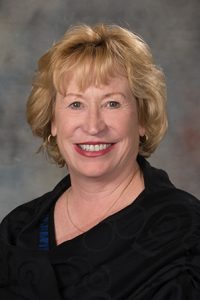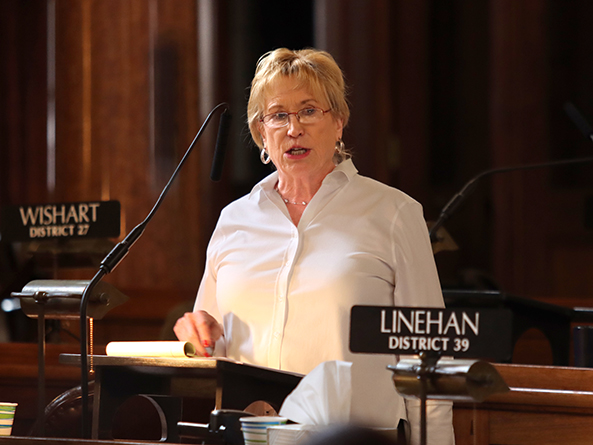Tax credit scholarship bill clears first round after cloture vote
Nebraskans could receive a tax credit for contributions to organizations that grant scholarships to students to attend private school under a bill advanced from general file March 8.

Elkhorn Sen. Lou Ann Linehan introduced LB753 at the request of Gov. Jim Pillen. The measure would allow individuals, passthrough entities, estates, trusts and corporations to claim a nonrefundable income tax credit of up to 50 percent of their state income tax liability on contributions made to nonprofit organizations that grant scholarships to students to attend private school.
Only Nebraska residents would be eligible for the scholarships, which could be used to pay tuition and fees at a qualifying privately operated elementary or secondary school.
Linehan said school choice in Nebraska currently is limited to those who can afford to move to a new public school district or pay private school tuition. LB753 would give thousands of low-income families the same opportunity to choose the best education for their children, she said.
A Revenue Committee amendment, adopted 43-0, replaced the bill. Among other changes, it would allow the state Department of Revenue to grant $25 million in credits in 2024, 2025 and 2026.
After that, if at least 90 percent of the credits in any given year are claimed, the annual limit would increase by 25 percent. Under the amendment, annual increases could continue until the total credit amount reaches $100 million.
The amendment also would cap contributions from individuals, passthrough entities and corporations at $100,000 and limit contributions from estates or trusts to $1 million.
The proposal would allow a taxpayer to carry forward any unused amount of the credit and apply it to their income tax liability for the next five years, but the credit could not be carried back. A taxpayer could not designate all or part of the contribution for the benefit of a certain student.
A scholarship granting organization would have to provide the department with sufficient information to show that it would use a tiered system that prioritizes certain students.
Students who received an education scholarship during the previous school year and their siblings would receive first priority. Students whose household income does not exceed 100 percent of the federal poverty level would be among those who receive second priority.
Sen. Tom Briese of Albion supported LB753, saying the proposed credit would encourage more people to donate to scholarship granting organizations, enabling more students to attend a school that fits their needs. He said the initial $25 million credit allocation is small compared to the $1.5 billion the state currently directs to public K-12 education.
“This is something that a large swath of Nebraskans … really want, and it’s time to respect their wishes on this,” Briese said. “We’re not going to harm public education one bit in doing this.”
Omaha Sen. Terrell McKinney also supported the bill, saying the public school system historically has failed Black children in North Omaha. LB753 alone would not solve that problem, he said, but more parents should have the opportunity to send their children to a private school if their public school is not working for them.
“Families and kids are tired of waiting … for something to improve,” McKinney said.
Sen. George Dungan of Lincoln opposed LB753, saying it would “whittle away” at state revenue that is used to fund public schools. In other states that have adopted similar programs, Dungan added, nonprofits have formed to take advantage of the newly available scholarships only to close after a few years.
Several lawmakers who opposed the bill, including Omaha Sen. John Fredrickson, said it indirectly would use public funds to benefit private schools that are allowed to discriminate against students based on their sexual orientation, gender identity and other factors.
“It is not clear to me whether or not my son could attend a majority of these schools,” he said, “not because of academic merit, but based on the fact that he has two dads.”
Sen. Justin Wayne of Omaha, who supported LB753, said Nebraska’s public schools also discriminate by suspending minority students at a disproportionate rate and declining to serve students with disabilities because of capacity limits.
Omaha Sen. Machaela Cavanaugh, an opponent of the bill, acknowledged that public schools discriminate in some cases but said it is not legal for them to do so.
“Instead of saying ‘public schools discriminate against Black kids, so we should give money to private schools,’” she said, “how about we address the fact that public schools discriminate against Black kids?”
Sen. Megan Hunt of Omaha introduced an amendment that would prohibit education scholarships from being used at private schools that discriminate on the basis of race, religion, gender, sexual orientation, gender identity, disability and other criteria. The amendment failed on a vote of 15-31.
After eight hours of first-round debate, Linehan filed a motion to invoke cloture, which ends debate and forces a vote on the bill and any pending amendments.
The motion succeeded on a vote of 33-12. Thirty-three votes were needed.
Lawmakers then advanced LB753 to select file on a vote of 31-12.


